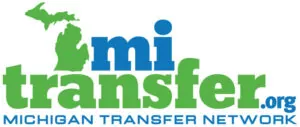Transferring from a Michigan college or university made simple and easy.

The Michigan Transfer Agreement (MTA) is designed to facilitate the transfer of general education requirements. Students can view a list of participating institutions online at www.macrao.org.
The MTA requirements should fulfill all or the majority of the student’s lower level general education requirements dependent on the requirements of their major. A transfer student must be admissible to a receiving institution in order to benefit from the MTA. Students may meet the requirements of the MTA as a stand-alone package.
To fulfill the Michigan Transfer Agreement, students must successfully complete at least 30 semester credits with at least a 2.0 GPA in each course. These credits, which will be certified by a Michigan college, should be met according to the following distribution (see the MTA Articulation Handbook for more details).
Semester Credit Requirements
- One course in English Composition
- A second course in English Composition OR one course in Communication
- One course in Mathematics from one of three pathways: College Algebra, Statistics, or Quantitative Reasoning
- Two courses in Social Science (from two disciplines)
- Two courses in Humanities and Fine Arts (from two disciplines, excluding studio and performance classes)
- Two courses in Natural Sciences, including one with laboratory experience (from two disciplines)
*Additional coursework may be necessary to satisfy the 30 credit hour requirement.
To learn more about how Baker College’s general education requirements compare with MTA requirements or to view Baker College courses that meet the Michigan Transfer Agreement, please see our Undergraduate and Graduate Catalog.
Following are the Baker College courses that meet the Michigan Transfer Agreement:
| Course number | course title | credits |
|---|---|---|
| COM 1010 | Composition and Critical Thinking I | 3 |
Select one Communication or English Composition course from the following:
| Course number | course title | credits |
|---|---|---|
| COM 1020 | Composition and Critical Thinking II | 3 |
| COM 2010 | Interpersonal Communication | 3 |
| COM 2050 | Public Speaking | 3 |
| COM 3110 | Business Communication and Report Writing | 3 |
| COM 3150 | Advanced Business Communication | 3 |
| COM 4010 | Communication Studies | 3 |
| TWR 4010 | Technical Writing and Documentation I | 3 |
| TWR 4050 | Technical Writing and Documentation II | 3 |
Select one Mathematics course from the following:
| Course number | Course Title | Credits |
|---|---|---|
| MTH 1150 | Quantitative Reasoning | 3 |
| MTH 1170 | College Algebra | 3 |
| MTH 1350 | Pre-Calculus | 4 |
| MTH 1510 | Calculus I | 4 |
| MTH 2310 | Linear Algebra | 3 |
| MTH 2410 | Discrete Math | 3 |
| MTH 2750 | Statistical Methods | 3 |
Select two Social Science courses from the following:
(Select courses from two different disciplines)
| Course number | Course Title | Credits |
|---|---|---|
| GEO 1050 | Introduction to Geography | 3 |
| ECN 2010 | Principles of Macroeconomics | 3 |
| ECN 2110 | Principles of Microeconomics | 3 |
| POL 1010 | Introduction to Political Science | 3 |
| PSY 1110 | General Psychology | 3 |
| PSY 2050 | Self and Society | 3 |
| PSY 2210 | Developmental Psychology | 3 |
| PSY 2350 | Psychology of Sexuality and Gender | 3 |
| PSY 2450 | Sports Psychology | 3 |
| PSY 3650 | Psychology of Aging | 3 |
| PSY 3110 | Abnormal Psychology | 3 |
| SOC 2010 | Sociology | 3 |
| SOC 3050 | Personal, Civic and Global Perspectives | 3 |
| SOC 3150 | Social Welfare | 3 |
| SWK 1110 | Poverty and Culture | 3 |
Select two Humanities courses from the following:
(Select courses from two different disciplines)
| course number | course title | credits |
|---|---|---|
| COM 4050 | International Communications | 3 |
| ENG 2050 | Mass Media and Communication | 3 |
| ENG 2410 | Creative Writing | 3 |
| HIS 1110 | Introduction to American History | 3 |
| HUM 3610 | Art Appreciation | 3 |
| HUM 3650 | Music Appreciation | 3 |
| HUM 3910 | Integrated Seminar | 3 |
| LIT 2010 | Introduction to Literature | 3 |
| SPN 1010 | Spanish I | 3 |
| SPN 1020 | Spanish II | 3 |
Select two Natural Sciences courses from the following:
(Select courses from two different disciplines)
| course number | course title | credits |
|---|---|---|
| BIO 1050 | General Biology I and Lab | 4 |
| BIO 1070 | General Biology II and Lab | 4 |
| BIO 1210/1211 | Human Anatomy and Physiology I with Lab | 4 |
| BIO 1220/1221 | Human Anatomy and Physiology II with Lab | 4 |
| BIO 1250 | Introduction to Disease | 3 |
| BIO 2150 | Pathophysiology | 3 |
| BIO 2210 | Nutrition | 3 |
| BIO 2410/2411 | Microbiology with Lab | 4 |
| CHM 1010 | General Chemistry I and Lab | 4 |
| CHM 1050 | General Chemistry II and Lab | 4 |
| CHM 1410 | Chemistry of Life | 3 |
| PHY 2150 | Integrated Physics | 3 |
| PHY 3210 | Principles of Astronomy | 3 |
| SCI 2710 | Environmental Science | 3 |
If these courses do not add up to 30 hours then the student must take an additional course from one of these groups.

